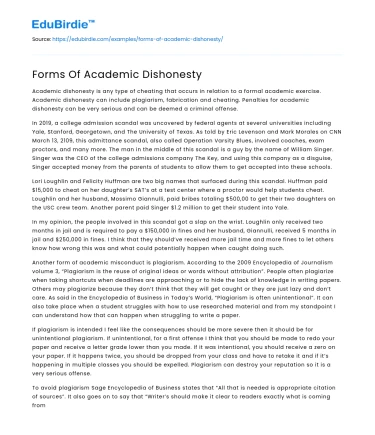Academic dishonesty is any type of cheating that occurs in relation to a formal academic exercise. Academic dishonesty can include plagiarism, fabrication and cheating. Penalties for academic dishonesty can be very serious and can be deemed a criminal offense.
In 2019, a college admission scandal was uncovered by federal agents at several universities including Yale, Stanford, Georgetown, and The University of Texas. As told by Eric Levenson and Mark Morales on CNN March 13, 2109, this admittance scandal, also called Operation Varsity Blues, involved coaches, exam proctors, and many more. The man in the middle of this scandal is a guy by the name of William Singer. Singer was the CEO of the college admissions company The Key, and using this company as a disguise, Singer accepted money from the parents of students to allow them to get accepted into these schools.
Save your time!
We can take care of your essay
- Proper editing and formatting
- Free revision, title page, and bibliography
- Flexible prices and money-back guarantee
Lori Loughlin and Felicity Huffman are two big names that surfaced during this scandal. Huffman paid $15,000 to cheat on her daughter’s SAT’s at a test center where a proctor would help students cheat. Loughlin and her husband, Mossimo Giannulli, paid bribes totaling $500,00 to get their two daughters on the USC crew team. Another parent paid Singer $1.2 million to get their student into Yale.
In my opinion, the people involved in this scandal got a slap on the wrist. Loughlin only received two months in jail and is required to pay a $150,000 in fines and her husband, Giannulli, received 5 months in jail and $250,000 in fines. I think that they should’ve received more jail time and more fines to let others know how wrong this was and what could potentially happen when caught doing such.
Another form of academic misconduct is plagiarism. According to the 2009 Encyclopedia of Journalism volume 3, “Plagiarism is the reuse of original ideas or words without attribution”. People often plagiarize when taking shortcuts when deadlines are approaching or to hide the lack of knowledge in writing papers. Others may plagiarize because they don’t think that they will get caught or they are just lazy and don’t care. As said in the Encyclopedia of Business in Today’s World, “Plagiarism is often unintentional”. It can also take place when a student struggles with how to use researched material and from my standpoint I can understand how that can happen when struggling to write a paper.
If plagiarism is intended I feel like the consequences should be more severe then it should be for unintentional plagiarism. If unintentional, for a first offense I think that you should be made to redo your paper and receive a letter grade lower than you made. If it was intentional, you should receive a zero on your paper. If it happens twice, you should be dropped from your class and have to retake it and if it’s happening in multiple classes you should be expelled. Plagiarism can destroy your reputation so it is a very serious offense.
To avoid plagiarism Sage Encyclopedia of Business states that “All that is needed is appropriate citation of sources”. It also goes on to say that “Writer’s should make it clear to readers exactly what is coming from where”. You can also use a plagiarism checker before you submit a paper.
References
- Bruton, Samuel V. 'Plagiarism.' The SAGE Encyclopedia of Business Ethics and Society, edited by Robert W. Kolb, 2nd ed., vol. 5, SAGE Reference, 2017, pp. 2637-2641. Gale eBooks, https://link.gale.com/apps/doc/CX6070900864/GVRL?u=txshracd2500&sid=GVRL&xid=6690524f. Accessed 2 Oct. 2020.
- Lewis, Norman P. 'Plagiarism.' Encyclopedia of Journalism, edited by Christopher H. Sterling, vol. 3, SAGE Reference, 2009, pp. 1074-1077. Gale eBooks, https://link.gale.com/apps/doc/CX3202300275/GVRL?u=txshracd2500&sid=GVRL&xid=da65dc64. Accessed 2 Oct. 2020.
- Fernândez-Calienes, Raul. 'Plagiarism.' Encyclopedia of Business in Today's World, edited by Charles Wankel, vol. 3, SAGE Publications, 2009, pp. 1290-1291. Gale eBooks, https://link.gale.com/apps/doc/CX3201500758/GVRL?u=txshracd2500&sid=GVRL&xid=a96e1301. Accessed 2 Oct. 2020.






 Stuck on your essay?
Stuck on your essay?

